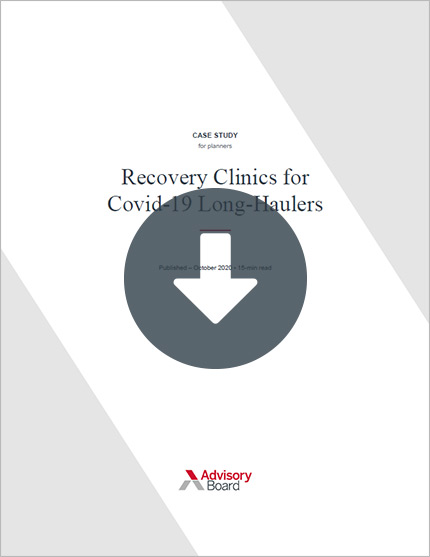Auto logout in seconds.
Continue LogoutWhile breakthrough cases of Covid-19 in vaccinated individuals remain rare, early research shows that a small number of those cases lead to "long Covid," in which Covid-19 symptoms persist for weeks or months.
Recovery clinics for Covid-19 long-haulers
Why data on breakthrough infections and long Covid is so limited
Research suggests that between 10% and 30% of adults who test positive for the coronavirus will go on to develop long Covid. The condition can arise even in those who develop only mild Covid-19 or are asymptomatic, the New York Times reports.
However, most research relates to Covid-19 in unvaccinated individuals. So far, there's little research on how often breakthrough infections lead to long Covid.
Zijian Chen, medical director at the Center for Post-Covid Care at Mount Sinai Health System, said, "It's too early to tell. The population of people getting sick post vaccination isn't that high right now, and there's no good tracking mechanism for these patients."
According to the Times, one reason for the lack of data is CDC's decision to track only breakthrough infections that result in hospitalization or death.
"It's very frustrating not to have data at this point in the pandemic to know what happens to breakthrough cases," Akiko Iwasaki, an immunologist at Yale School of Medicine, said. "If mild breakthrough infection is turning into long Covid, we don't have a grasp of that number."
What the early research can—and cannot—shed light on
However, early research shows that breakthrough infections can lead to long Covid, at least in some cases, the Times reports.
For instance, in one study published in the New England Journal of Medicine, researchers looked at 1,497 fully vaccinated health care workers at the Sheba Medical Center in Israel. Just 39 of the workers developed breakthrough infections, but of those, seven—or 19%—developed symptoms that lasted at least six weeks. These symptoms included headaches, muscle pain, loss of taste and smell, and fatigue.
Gili Regev-Yochay, director of the infection, prevention, and control unit at Sheba and an author on the study, said the results are "really disturbing."
"If this is what we're going to see with all of the even mildly symptomatic infections that we're seeing now, it's definitely worrisome," she said.
Eric Topol, a professor of molecular medicine at Scripps Research, said the study "is the really first to give us an indicator that there's some long-haulers among that small group of people [who] had breakthrough infections."
However, the authors of the study cautioned that the sample size of breakthrough infections was small. Moreover, Regev-Yochay noted the study's focus was examining antibody levels in the infected, rather than studying the risk of long Covid. "It was not the scope of this paper," she said. "I don't think we have an answer to that."
Separately, Ziyad Al-Aly, a clinical epidemiologist at Washington University in St. Louis, has searched for instances of long Covid in fully vaccinated individuals and, so far, identified them only rarely.
Al-Aly's research has focused on data from the more than five million veterans within the Department of Veterans Affairs database, including 200,000 who developed Covid-19.
"Of the people who get vaccinated and end up with a breakthrough infection, their risk of coming back to the clinic with some long Covid manifestation is very, very small," Al-Aly said.
But Maureen Lyons, medical director of the Care and Recovery from Covid-19 Clinic at Washington University, said the lack of long Covid cases in Al-Aly's research might "just might be a lag time issue," since Covid-19 vaccines were mostly rolled out within the past few months.
Natasha Altman, a cardiologist at UCHealth University of Colorado Hospital agreed that it simply might be too soon to figure out how the vaccine affects a person's risk of developing long Covid.
"I think the trends are ... only really going to start bearing out in the next six months," she said. (Parker-Pope, New York Times, 8/17; Edwards, NBC News, 7/15; Stein, "Shots," NPR, 7/28)
Download the case study

Several health systems have set up dedicated recovery clinics to help treat and coordinate care for long-haulers. This resource provides an overview of Covid-19 recovery clinic models pioneered by two early adopters—The University of Iowa Hospitals and Clinics and the University of Pennsylvania Medicine—and considerations for assessing whether it is a model you should pursue.
Don't miss out on the latest Advisory Board insights
Create your free account to access 1 resource, including the latest research and webinars.
Want access without creating an account?
You have 1 free members-only resource remaining this month.
1 free members-only resources remaining
1 free members-only resources remaining
You've reached your limit of free insights
Become a member to access all of Advisory Board's resources, events, and experts
Never miss out on the latest innovative health care content tailored to you.
Benefits include:
You've reached your limit of free insights
Become a member to access all of Advisory Board's resources, events, and experts
Never miss out on the latest innovative health care content tailored to you.
Benefits include:
This content is available through your Curated Research partnership with Advisory Board. Click on ‘view this resource’ to read the full piece
Email ask@advisory.com to learn more
Click on ‘Become a Member’ to learn about the benefits of a Full-Access partnership with Advisory Board
Never miss out on the latest innovative health care content tailored to you.
Benefits Include:
This is for members only. Learn more.
Click on ‘Become a Member’ to learn about the benefits of a Full-Access partnership with Advisory Board
Never miss out on the latest innovative health care content tailored to you.

